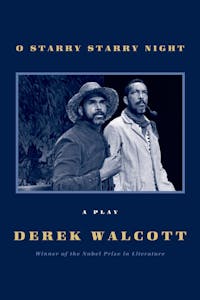O Starry Starry Night
A Play
 Download image
Download image
ISBN10: 0374227071
ISBN13: 9780374227074
Trade Paperback
112 Pages
$18.00
CA$24.50
In Derek Walcott's new play, O Starry Starry Night, two world-renowned artists come to life as they wrestle both with grand themes—friendship, loyalty, fame—and with more mundane concerns, money primary among them. The scenes Walcott sketches summon several of van Gogh's most famous paintings: Sunflowers, The Night Café, The Bedroom at Arles. His manipulation of language—van Gogh's eloquent monologues giving way to more abstract speeches—evokes the painter's descent into madness. Over the action hangs the threat of violence, of death, which lends the play a potent urgency; for at least one of the characters, time is quickly running out.
Two painters—Paul Gauguin and Vincent van Gogh—are living together in the sleepy town of Arles in 1888. Soon, Gauguin, frustrated by van Gogh's refusal to acknowledge his increasingly troubled mind, will depart for Paris. In two years, van Gogh will be dead by his own hand. In the meantime, the friends discuss their craft; they frequent a local café that van Gogh will soon immortalize; they become acquainted with a young prostitute, Lotte, who becomes Gauguin's lover; they argue; they paint.
O Starry Starry Night is powerfully wrought, and demonstrates once again the sharpness of Walcott's eye: as a painter, as a poet, as a writer, and, above all, as an observer of human follies, foibles, failings, and aspirations.
Reviews
Praise for O Starry Starry Night
"[The] language [of O Starry Starry Night] is what you would expect from the Nobel laureate—rich, seductive, scopious, with lines echoing Shakespeare at one moment then scatological the next; yet always perfectly, poetically devised for the page . . . Something of Beckett's Waiting for Godot —with its pair of two human beings feeding off one another—flows through the veins of this. Beyond the glimmer of the stars, candles, street lamps and paintings onstage are questions of loneliness; of love. At moments you can't help but chuckle at Walcott's deadpan and often sly sense of humor . . . This is a play well-worth seeing, if only for Walcott's language. It is certainly a play worth reading . . . Here is a play about love, not necessarily in a carnal sense but about creative tension; about what we leave behind after we die; about who we love and why; who we are permitted to love; and who we permit ourselves to love. The question at the heart of the proceedings is whether love, in whatever form, is not itself a kind of ecstatic madness. Both characters are in an eternal dialogue: one is concerned with ideas, another pragmatism. Neither would have been the same without the other. The ultimate play about one of history's most famous bro-mances." —Andre Bagoo, Trinidad and Tobago Newsday
Reviews from Goodreads
BOOK EXCERPTS
Read an Excerpt
ACT I
Scene One
[Pre-dawn in Arles. A café pavement, under an awning. GAUGUIN sits at a table, drinking a coffee. Lamps fading. The PROPRIETOR, sweeping, pauses, points.]
PROPRIETOR
Now dawn will...



